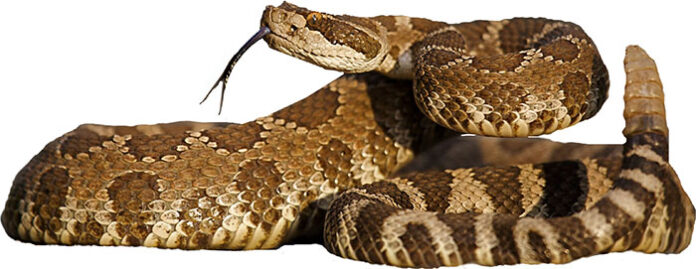By Barb Christensen

Are snakes friend or foe in the garden? You decide for yourself.
These legless creatures live almost everywhere in Arizona. Snakes primarily live in the open desert or mountainous areas away from people, but what happens when we push our city boundaries closer toward outlying desert areas?
Western diamondback and Mojave rattlesnakes are the most common of the venomous variety in our area, but they are almost never deadly to humans if we can get treatment right away. In fact, less than 1 percent of rattlesnake bites results in death in our state, according to the Arizona Poison Center. For the most part, all snakes just want to be left alone to bask in the sun or to hibernate. However, it is best not to make assumptions about the benevolence of any snake.
Many non-poisonous snakes such as the California kingsnake, Sonoran gopher snake, desert night snake, whip snake, coachwhip snake, the tiny ground snake and various kinds of garter snakes also inhabit our environs. Some of these non-venomous snakes even prey on rattlesnakes. As an example, by turning a rattlesnake into its own tasty meal, the common kingsnake helps to control the venomous snake population.
All snakes can help in our gardens by eliminating unwanted rodents that cause havoc and eat our produce. Mice, rats and gophers are known to carry deadly diseases and viruses. Hantavirus, salmonella, rat bite fever, typhus, plague and Lyme disease are easily transmitted by these rodent pests. If left undiagnosed, any one of these diseases or viruses can be fatal, especially for children.
Snakes aren’t for everyone, obviously, and there are measures you can take to protect yourself and your property. A good line of defense is a snake fence around any open areas. Also, make sure to trim around the bottom of your bushes 1-2 feet. Pick up any dead branches, leaves, trash or other debris from the yard or porch, eliminating places for snakes to hide. Fill in gopher holes, as snakes like to move into vacant holes to get out of the heat or to hibernate.
Even if you decide snakes are beneficial and your friend, you may choose to lessen the chances of encountering one by building raised garden beds rather than in-ground beds. And, if you find an unwanted creepy-crawly in your garden, please do not attempt to remove it yourself. Instead, phone a professional. They will remove the snake, placing it back into its natural habitat.
No matter what you decide about the benefits or dangers of snakes, enjoy your garden and be happy!
Contact a Master Gardener at Maricopa Agricultural Center at 520-374-6263 or [email protected]. Our diagnostic office at the MAC is open Monday–Friday from 9 a.m. to noon to assist you with your gardening issues.
Barb Christensen is a Master Gardener and a resident of Maricopa.
This column appears in the October issue of InMaricopa.

















![Shred-A-Thon to take place tomorrow An image of shredded paper. [Pixabay]](https://www.inmaricopa.com/wp-content/uploads/2024/03/shredded-paper-168650_1280-100x70.jpg)
